The Yelkouan or Mediterranean Shearwater Puffinus yelkouan, endemic to islands in the Mediterranean Sea, has been identified by ACAP as a potential candidate for listing within the Agreement (click here). A recent paper, published on-line in the journal Animal Conservation by Elsa Bonnaud and colleagues at the Mediterranean Institute for Ecology and Paleoecology, Paul Cézanne University shows how this Near Threatened shearwater has benefited from the control of feral domestic cats Felis catus on the French island of Port Cros, a national park in the Hyeres Island Group.

The paper's abstract follows
"Introduced predators on islands are responsible for numerous native species extirpations and extinctions. Predation by cats is particularly detrimental to seabirds and cat control or eradication is generally the best option to reduce their negative impacts on native fauna. However, potential cascading effects, such as mesopredator release effect, need to be monitored after cat removal. In Port-Cros Island, a cat control campaign was undertaken to eliminate the strong and recurrent threat from feral cat predation to the small Yelkouan Shearwater Puffinus yelkouan population, without harming a neutered domestic cat population. To evaluate the conservation value of this campaign for an island endemic and endangered species, the diet and impact of the remaining domestic cats were studied through scat analysis and trap success. Moreover, to evaluate the recovery of the seabird population and detect any potential mesopredator release effect, shearwater and rat populations were monitored before, alongside and after the cat control. Only live traps were used, and most cats were trapped in the first year of cat eradication. The last incidence of cat predation on the Yelkouan Shearwater occurred the following year. The recovery of the shearwater population, occurring the first year of cat control, was mainly attributable to the settlement of new breeders in the colony. Rat population dynamics fluctuated widely but, even though the interactions between rats and shearwaters at breeding cavities increased, no evidence of rat predation on shearwaters was recorded. Thus, cat control on Port-Cros Island was a success for native species conservation, proving that such management strategy can induce an increase in the population of the endemic species, here the Yelkouan Shearwater, without any evidence of a mesopredator release effect."

Visit http://www.puffin-hyeres.org/english.htm to learn more of French efforts to save this species (and Cory's Shearwater Calonectris diomedea) in the Hyeres Islands.
Information on conservation efforts for the Yelkouan Shearwater in Malta may be found at http://www.lifeshearwaterproject.org.mt/en/.
With thanks to Elsa Bonnaud for supplying the photographs.
Reference:
Bonnaud, E., Zarzoso-Lacoste, D., Bourgeois, K., Ruffino,L., Legrand, J. & Vidal, E. 2010. Top-predator control on islands boosts endemic prey but not mesopredator. Animal Conservation. DOI: 10.1111/j.1469-1795.2010.00376.x. http://onlinelibrary.wiley.com/doi/10.1111/j.1469-1795.2010.00376.x/abstract.
John Cooper, ACAP Information Officer, 6 November 2010

 Français
Français  English
English  Español
Español